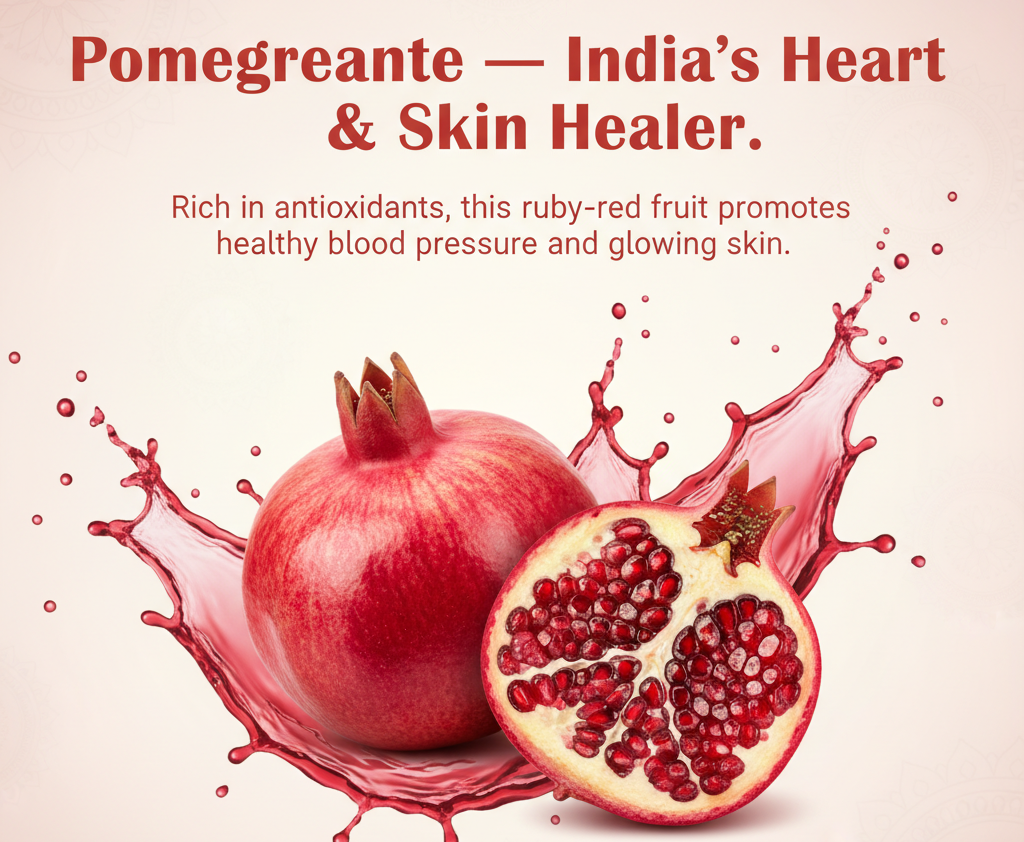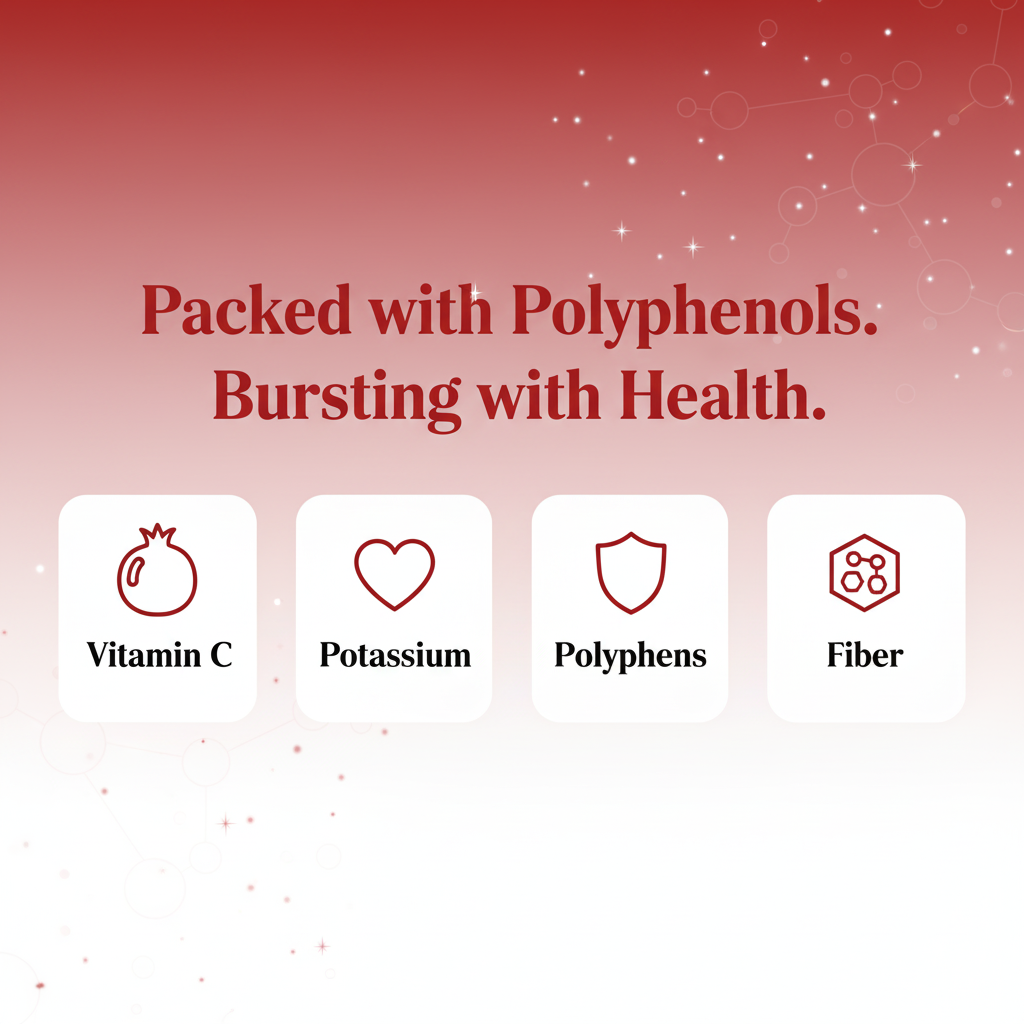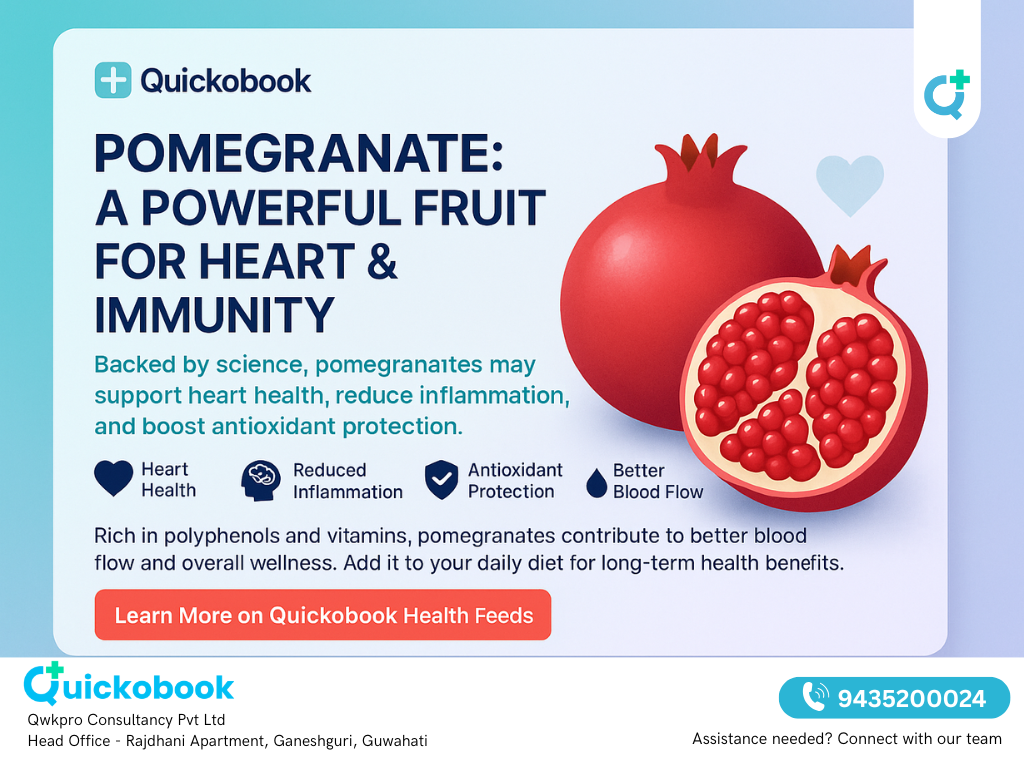Introduction: The Ruby-Red Fruit of Health
Pomegranate, known in India as Anar, is more than a delicious fruit—it’s a powerhouse of antioxidants, vitamins, and plant compounds that promote holistic health. Traditionally valued in Ayurveda for heart, digestion, and skin care, modern science has now confirmed what ancient wisdom long believed. From regulating blood pressure to enhancing skin health, pomegranates are a natural way to nourish your body inside and out.

What Makes Pomegranate So Special?
Pomegranate (Punica granatum) is packed with polyphenols like punicalagins and anthocyanins, which give it its vibrant red color and powerful antioxidant properties. These compounds help neutralize free radicals, reduce inflammation, and support cell repair.
Nutritional Highlights (per 100g):
- Calories: ~83 kcal
- Vitamin C: 17% of daily requirement
- Potassium: 10% of daily requirement
- Fiber: 4g
- Folate, Vitamin K, and polyphenols: abundant
This nutrient mix makes pomegranate an excellent fruit for cardiovascular, digestive, and skin health.

Pomegranate and Blood Pressure: A Heart’s Best Friend
1. Rich in Antioxidants
Pomegranate juice contains antioxidants three times higher than green tea. These protect the blood vessels from oxidative stress and plaque buildup, which are major causes of hypertension.
2. Improves Arterial Health
Clinical studies show that daily pomegranate consumption helps reduce systolic blood pressure by relaxing arterial walls and improving nitric oxide levels.
3. Prevents Bad Cholesterol Oxidation
LDL (bad cholesterol) oxidation contributes to atherosclerosis, a key risk factor for heart attacks. Pomegranate’s antioxidants inhibit this oxidation, helping to maintain healthy blood flow.
4. Anti-Inflammatory Properties
Chronic inflammation is linked to heart disease and hypertension. Pomegranate polyphenols reduce markers of inflammation, contributing to better cardiovascular outcomes.
Tip: Drink 100–150 ml of fresh pomegranate juice daily or include half a cup of seeds in your diet for steady blood pressure control.
READ ALSO: Osteoporosis: 6 Symptoms That Show Up In Hands, Legs, And Teeth You Must Not Ignore
Glowing from Within: Pomegranate for Skin Health
1. Boosts Collagen Production
Vitamin C and polyphenols in pomegranate promote collagen synthesis, improving skin elasticity and reducing wrinkles.
2. Fights Free Radicals
Free radicals damage skin cells and speed up aging. Pomegranate’s antioxidants act as natural armor against sun and pollution damage.
3. Hydrates and Rejuvenates
Pomegranate seed oil penetrates deeply into the skin, restoring moisture and repairing damaged tissues.
4. Reduces Acne and Inflammation
Anti-inflammatory and antimicrobial effects help in managing acne, redness, and breakouts.
5. Protects Against UV Damage
Ellagic acid in pomegranate can help minimize sun-induced skin damage and pigmentation.
Pro Tip: Apply pomegranate face packs weekly or drink fresh juice to maintain radiant, youthful skin.

Other Proven Health Benefits
1. Improves Cholesterol Levels
Pomegranate helps increase HDL (good cholesterol) while reducing LDL. This dual effect protects against heart disease.
2. Supports Weight Loss
High in fiber and low in calories, pomegranate aids digestion, keeps you full longer, and helps reduce overall calorie intake.
3. Controls Blood Sugar
Pomegranate has a low glycemic index and contains compounds that improve insulin sensitivity—beneficial for diabetics.
4. Fights Inflammation
Punicalagins reduce inflammation in the digestive tract, joints, and arteries, improving overall health.
5. Enhances Immunity
Vitamin C and antioxidants boost white blood cell activity, making your body more resistant to infections.
6. Improves Memory
Studies suggest that pomegranate polyphenols improve cognitive function and memory in older adults.
How to Include Pomegranate in Your Diet
- Fresh juice (avoid added sugar)
- Sprinkle seeds on salads, oats, or yogurt
- Use pomegranate molasses in chutneys and marinades
- Mix with lemon water for a refreshing detox drink
- Add to smoothies for a nutrient boost
Potential Side Effects and Precautions
- Medication interaction: May enhance effects of blood pressure or cholesterol drugs.
- Allergies: Rare but possible; watch for itching or swelling.
- Sugar caution: People with diabetes should prefer whole fruit over juice.
Always consult a general physician or nutritionist before starting daily consumption if you’re on medication.
When to See a Doctor
If you experience dizziness, uncontrolled blood pressure, or persistent fatigue despite eating healthy, consult your nearby general physician. Platforms like Quickobook help you find trusted doctors in your city for heart and wellness check-ups.

Conclusion
Pomegranate is not just a fruit—it’s a symbol of vitality. Backed by both Ayurveda and modern research, it helps regulate blood pressure, rejuvenates skin, and strengthens your heart. Adding this fruit to your daily routine is a small but powerful step toward better health.
Enjoy it fresh, in juice, or as part of your meals—your heart and skin will thank you!
Quickobook CTA
Book your General Physician or Nutritionist consultation today on Quickobook.com. Get expert advice on diet, blood pressure control, and lifestyle management—all from verified doctors near you.
Disclaimer
This blog is for educational purposes only and does not substitute professional medical advice. Always consult a licensed healthcare provider before making dietary or treatment changes.









Comments (0)
No comments yet. Be the first to share your thoughts!
Leave a Comment